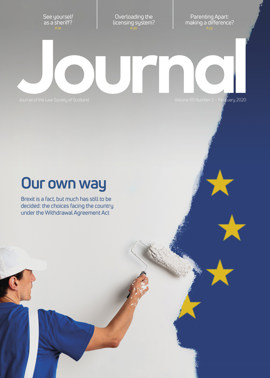Time bars and cohabitants: an equitable solution?

Time bars in cohabitation claims have troubled family lawyers, and clients, since the introduction of the Family Law (Scotland) Act 2006, s 28. It allowed a claim for a capital sum due to economic advantages or disadvantages arising from the relationship – but this must be raised in court within 12 months of the date of separation.
Prior to 2016, many family lawyers assumed that if the one year time limit was missed, the common law remedy of unjustified enrichment would remain open. However, Courtney’s Exrs v Campbell [2016] CSOH 136 held that the subsidiarity principle applied to cohabitation cases – i.e. recompense can normally only be pursued when no other remedy is or has been available, unless there are “special and strong circumstances” why the equitable remedy should remain open.
This issue has now been helpfully and comprehensively reviewed by a bench of five judges in Pert v McCaffrey [2020] CSIH 5 (29 January 2020). The main question was whether, and to what extent, this principle applies to cohabitation cases where the pursuer has not made an application under s 28.
Walking away with nothing
The parties initially lived together in a house owned by the pursuer. They then moved to another property, taking title in joint names. This purchase was funded entirely from the sale proceeds of the pursuer’s property. The pursuer averred that “the defender undertook that in the event the relationship ended he would walk away with nothing in view of the source of funds”. The relationship ended in 2012; the pursuer was sequestrated in 2015. Her trustee sold the house in January 2017, paying half the net proceeds to the pursuer’s creditors and the other half to the defender. The pursuer sued for that sum, on the basis of unjustified enrichment.
The defender argued that the pursuer’s only remedy had been under s 28 and was now time barred; she could not claim for unjustified enrichment, having elected not to pursue the statutory remedy. The sheriff at first instance followed Courtney’s Exrs, and dismissed the action.
In the Inner House decision, the Lord President set out an instructive overview of the place of equity in Scots law, and recompense as an equitable doctrine (paras 17-22). He affirmed dicta from previous case law, that “a person is normally bound to adopt the ordinary legal remedies open to him to resolve his or her difficulty before resorting to what are sometimes described as equitable remedies”.
In the absence of any “strong or special circumstances” which meant this normal rule would not apply, he then considered what alternatives may have been open to the pursuer. First, in assessing s 28, he noted that the court’s power was in “weighing up the various economic advantages and disadvantages and making a judgment, essentially of a discretionary nature, on whether a capital sum ought to be awarded”. The court would assume in doing so that the ordinary legal remedies open to the parties had been, or could be, exercised. The Inner House accordingly viewed s 28 as an additional, rather than alternative, remedy to recompense, therefore disagreed with Courtney’s Exrs.
However, this did not result in the pursuer’s success. She had averred, somewhat loosely, that the defender would “walk away with nothing” at the end of the relationship, which the court took to mean an agreement that he would transfer his share of the property to her for no value. On that basis, her “obvious” remedy was to seek specific implement of that agreement, failing which damages. It was this alternative remedy, rather than s 28, which was fatal to the claim for recompense. In any event, the five year prescriptive period for either remedy started running from the date of separation, and she had raised the action out of time.
Interplay of rights
What are the lessons for family lawyers? First, there is no absolute bar against claiming unjustified enrichment after the s 28 time bar. Secondly, be aware of the other possible claims which may be available to your client, such as specific implement or damages. How might these claims and s 28 overlap, alternate or exclude each other? Thirdly, carefully consider your pleadings, in particular where there are potential overlapping claims – might the way you present a s 28 case exclude another possible route? Lastly, even when dealing with contractual or recompense claims, be aware of the prescription limits.
The law relating to cohabitants may well change further, in light of the March 2019 Law Society of Scotland review, Rights of Cohabitants, and the more extensive discussion paper expected shortly from the Scottish Law Commission, so watch this space.






